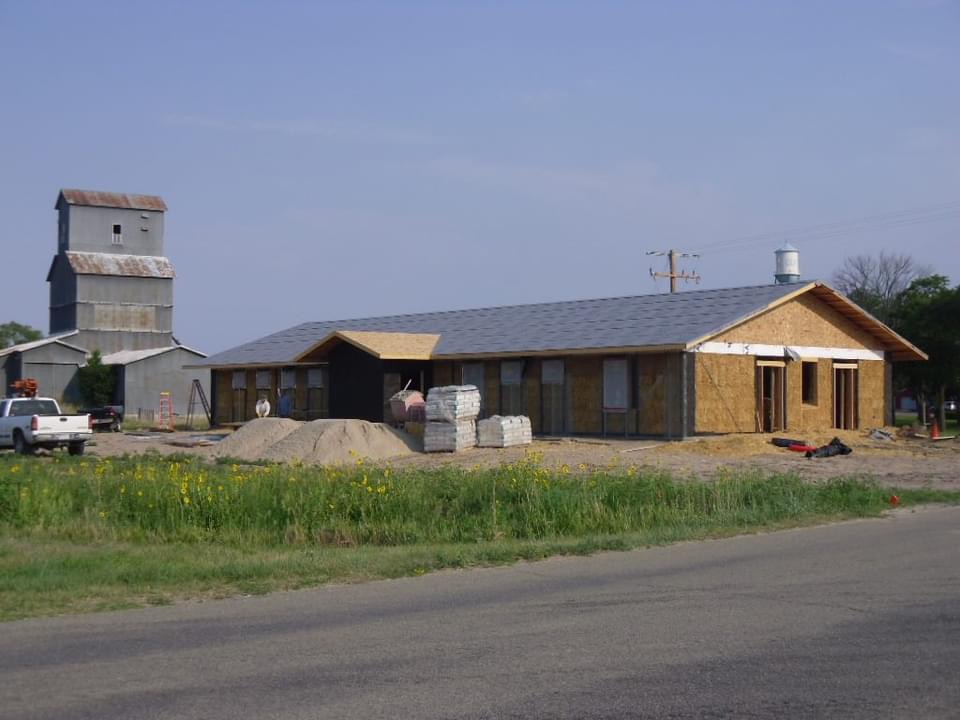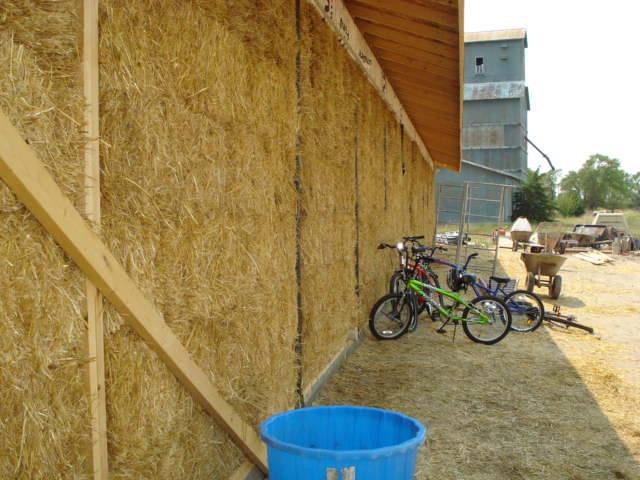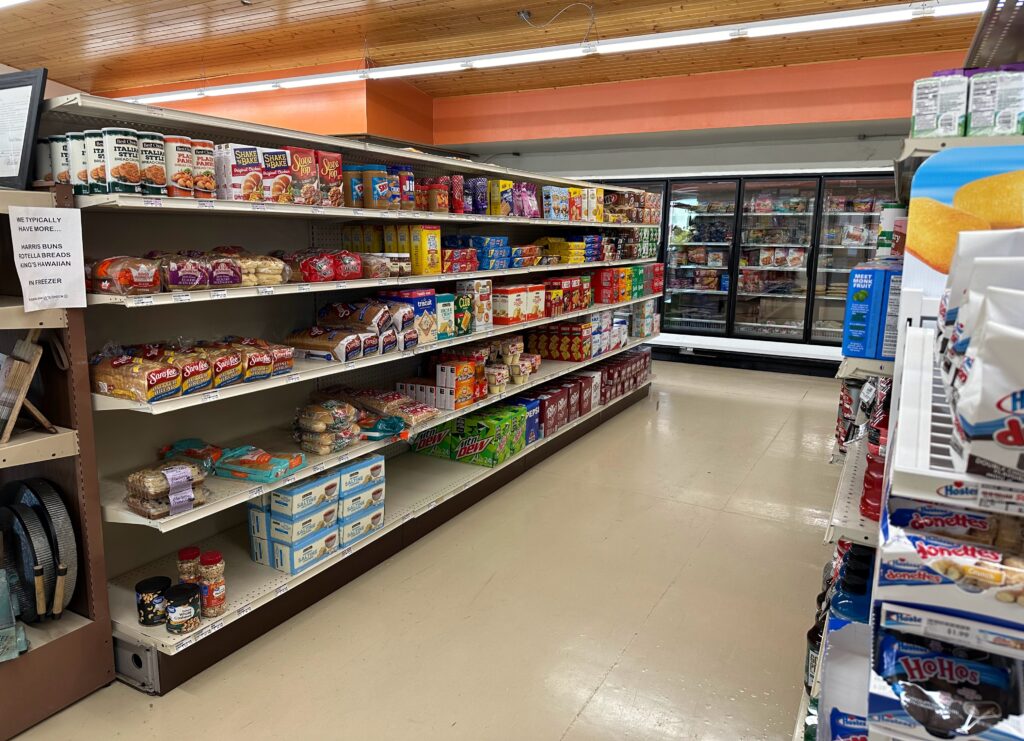The group of teachers had a straightforward but daunting assignment before them: How could Cody-Kilgore, a small district nestled in the Nebraska Sandhills, buck the trend of rural decline and revitalize the school?
Teachers Stacey Adamson and Tracee Ford latched onto an unusual idea that started as a joke – one that grew more unusual as it progressed.
What about a grocery store run by students?
Now nearly two decades after the idea first surfaced, the Circle C Market – a student-run grocery store made of straw bales – continues to serve Cody and the nearby areas. Students get hands-on experience in marketing, finances and operations, while the village of roughly 170 people gets a local option in what would otherwise be a grocery desert, with the nearest option being a 40-mile drive down U.S. Highway 20 to Valentine.
Enrollment in the district has ticked up slightly from 140 students in the 2013-14 school year to 156 currently. Earlier this summer, voters approved a bond to build a new school.
Today, at a time when rural grocery stores are closing at an alarming rate, Cody’s Circle C is open six days a week – and represents far more than groceries. It’s a symbol of small-town grit, of neighbors helping neighbors.
“It was all hands on deck,” recalled Eva Sampson, who was in junior high when the store was being built. “They had a contractor there, and we were running wheelbarrows up ramps, and dumping, and throwing straw bales around. … If you got all your work done in class, you were down working on the grocery store.”
***
When Adamson first offered up the grocery store idea, she didn’t completely pull it out of thin air. Arthur, another small Nebraska town trying to reverse its fortunes, had tried the same thing, opening a store in November 2000, she said. At first, her friend and fellow teacher Ford was the only one excited about the idea.
“I actually called around and said to people in outlying areas, ‘what would it take for you to come to Cody?’ And one gal in particular told me, ‘if I have two towns to choose from, I can’t envision choosing the town that doesn’t have a grocery store.’ So I was like, well, we’re on the right track then,” Adamson recalled.
The idea quickly picked up steam and became a community effort. They submitted a pivotal grant application in short order and helped form a student steering committee. “It wasn’t something we got to kick the tires on very much,” Adamson laughed.
They did know that they wanted the store on a spot right off the highway. The land belonged to the Nebraska Game and Parks.
Kylee Hesseltine, who was in eighth grade at the time, remembered several phone conversations with the state agency that ended in a hard “no.” The group of students and teachers packed up and headed to Lincoln for a face-to-face meeting.

After that meeting, Nebraska Game and Parks granted a 99-year lease for the store. The students learned an important lesson.
“I absolutely did learn to not take the first no. Had we done that, the town of Cody would not have milk, eggs and potatoes for sale,” said Hesseltine, who now works as a real estate agent and credits the grocery store experience with giving her skills that make her successful today.
Ahead of construction, a local businessman approached the teachers with an idea: Straw. George Johnson of Cody-based George Paul Vinegar had started making his small-batch vinegar in a building made of straw bales. The building stayed cool in the summer and warm in the winter, he said. Plus, by using straw bales, the kids would be able to help out and the building supplies would be cheaper.
“The more we talked about it, the more it made sense to go that way,” Ford said.
Big 1,300-pound round bales were donated, and the students tore them apart to make smaller, square bales, using chicken wire to keep the straw intact.
“Anything the kids could do, we had them do,” Ford said.
During the school year, students would come help for an hour all throughout the day.
During the summer, Ford drove around town honking, knocking, and shouting “I need help.” Kids would ride their bikes to the building site.

Kids helped trowel the stucco exterior, and the school’s drafting class drew up floor plans. One student, helped by a few classmates, submitted a bid to roof it and got the job, Ford said.
After six years of planning, grant writing and hard work, the store opened on April 29, 2013. A month later on May 24, Nebraska Gov. Dave Heineman was on hand for the ribbon cutting.
“And it’s been in business ever since,” Adamson said proudly.
***
Circle C has persisted during a tough time for Nebraska’s rural grocery stores.
The state had 204 rural grocery stores in 2021, a nearly 30% drop from the 290 that existed in 2016, according to researchers at the University of Nebraska-Lincoln. In the last five years, stores have closed in Harrison, Crawford, Hay Springs and Rushville.
“Rural grocery stores are really in crisis in our state,” said Jillian Linster, policy director at the Center for Rural Affairs.
That crisis can devastate rural communities, Linster explained. Aside from the practical benefit of having food nearby, independently owned stores keep money and people in their communities. They often play an outsized role in the town and serve as a source of pride for its residents.
“A local, independently owned grocery store is a vital part of successful and healthy rural communities in our state and really across the Midwest-Plains region,” Linster said.
Cody-Kilgore Superintendent Ryan Orrock said the village benefits in more ways than one.

“I have been to many towns that don’t have a grocery store, and you can tell the impact it has,” he said. “As a school, giving our students an opportunity to learn the business side of things benefits our future leaders, and I hope it brings enough pride to keep them around Cody.”
The significance of these stores appears to be gaining greater attention.
Earlier this year, State Sen. Teresa Ibach introduced a bill creating a grant program for small, locally-owned stores. The bill received support during a legislative hearing, but did not advance out of committee.
Ibach, a Republican from Sumner, did initiate an interim study on the availability of healthy and affordable food options. That study, which the Center for Rural Affairs helped conduct, may be used in a modified rural grocery store bill, which Ibach has expressed interest in introducing.
***
Today, business teacher Liz Ravenscroft oversees the Circle C and conducts the majority of her classes there. She is the first to admit that operating a student-run store in the Sandhills serves up daily challenges.
Trucks don’t typically deliver there unless they meet a certain minimum. Many items come from Walmart or Sam’s Club. Ravenscroft tries to make it to the Walmart in Chadron twice a month. She drives to Valentine for produce, which the Circle C sells at little to no markup.
“It’s more of a service to the community and to the people that live in town because there are some elderly and others that solely rely on our grocery store for their groceries,” she said. “You gotta have some stuff available.”
Students take a shuttle from the school to the store. Ravenscroft also runs the store during the majority of her instruction time.
Students learn how to price, how to stock and rotate, how to check in a truck. One of Ravenscroft’s accounting students did the books over the summer. “She writes all the checks. I just need to sign them. She also does the billing. I have some good kids this summer that are really hard workers,” Ravenscroft said in July.

During school hours, students aren’t paid to work in the store. They work under a certificate signed by the superintendent because the store is considered an entrepreneurial lab.
The kids get paid minimum wage any time they work outside of school hours. Cody-Kilgore Schools are a four-day per week institution so Friday through Saturdays, plus summers, are paid hours for store workers.
Ravenscroft is starting her fourth year of teaching. It’s a challenge to balance her various duties, but she says most of the customers are understanding and patient.
“People who aren’t in education don’t understand that in a small school you wear so many hats at the same time. And our store is a unique situation,” she said.
Adamson believes the learning experience for the students, some of whom come from hard home lives, is worth the challenge. “By the end of their time there … they will look you in the eye. They’ll say ‘good afternoon.’ They’ll say, ‘thank you. Can I carry your groceries to the car?’ It’s a game changer for a lot of kids.”
Former students agree. Lindsay Taylor was a sophomore when the idea for the store formed. She and others collected resident’s grocery store receipts so they could gather data ahead of the store’s opening.

“It was a very unique, very cool experience and at the time we were just a bunch of kids. We didn’t know what we were doing, but sitting in on those meetings? That was invaluable.”
For Adamson, the one who first had the idea for the store all those years ago, its importance came through one day when she was working there. An older resident, who had recently been discharged from the hospital and didn’t have any relatives in town, showed up at the store. She bought a very small order.
“Part of the motivation to build this store was to help people when they didn’t have a way to get to town for groceries,” Adamson said. “I really feel like I’m seeing it lived out in this moment because she was leaning on the counter, could barely breathe, had oxygen. And she teared up, and she was like, ‘I don’t know what I’d do without this store.’ And then I teared up.”




5 Comments
We visited a couple of years ago. This was the cleanest, best organized grocery I’ve ever shopped in. We bought lunch to eat in the park because we’d found nowhere to eat in the 60 miles or so prior to that.
Absolutely fantastic! I sent an email to Sen. Ibach during the past regular Legislature session in support of her bill. Hopefully it’ll get to the floor in the future.
Love this story ❤️ I know Stacey well, clear back when she was Rodeo queen. She has it all, beauty, brains and athletic ability.
Very good story about a very good idea.
An Awesome story about the town and school I graduated from 50 years ago. My sister Mary helped get that store going. What a great opportunity for the students to learn life lessons and skills.